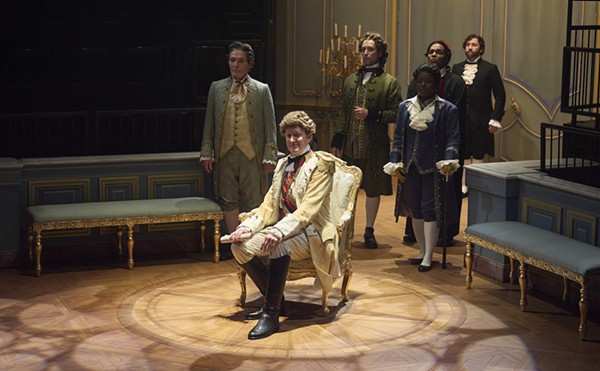Prithee, hast thou wished for more Shakespeare in thine life? A more accessible Shakespeare, perchance? A Shakespeare that engages, even when its ancient language tangles in the ear like vines? Then get thee to Lakewood, my good friends, for the Beck Center's current production of King Lear, an extraordinary piece of theater wherein the Bard's sometimes oblique language is rendered plain as day by an animated cast delivering energetic, illuminating performances.
Which is not to say this is Shakespeare for Dummies. Under the direction of Cleveland playwright Eric Schmeidl, this moving family tragedy proves as complex, anguished and, ultimately, philosophic as any student of the classics might wish.
Still, much effort has apparently gone into ensuring the audience's ability to stick with the story line. Key to this is the extraordinary physicality of the performances: Anytime you aren't certain exactly what is happening, just consult the actors' expressive faces and assertive body language, and all shall be revealed.
As a result, this King Lear is a joy to watch, whether it's the psychopathic soliloquies of the bastard son Edmund (played with spitting intensity by Daniel Telford), the sly nastiness of Lear's scheming elder daughters Goneril (Julia Kolibab) and Regan (Lisa Louise Langford), or the terrifying transformation of Edgar (a gymnastically inclined James Alexander Rankin) from a milque-toasty semi-royal into a pouncing, scurrying feral animal.
And then, of course, there is Lear — Shakespeare's most tragically demented royal and one of the most disturbingly lost souls of all time — who puts the entire tale in motion by foolishly believing his scheming daughters will still care for him once his royal crown is fast within their dirty, blood-stained hands.
"Sharper than a serpent's tooth it is to have a thankless child," the king famously complains, once he's realized his strategic error. But by then, the wheels are all in motion, and the cart is tearing headlong into madness, murder and mayhem.
In the role of the beleaguered monarch, it is hard to imagine a more fitting presence than Cleveland stage veteran Robert Hawkes. From his unruly white locks to his pale, bony feet, Hawkes gives us a Lear who is not merely mad, but whose true devastation comes from the dawning understanding that, for most mere mortals, life is ruled by indifferent gods in a heartless universe.
The distinction is important. It is one thing for an actor to play "crazy." It is much more demanding to anchor that dementia with the weight of existential despair. Yet this is the world that Shakespeare gives us, one where the only alternative to debasement and despair is the personal decision to be good. Like all the best Lears, Hawkes takes us into that world. In the process, he turns in a performance that is, by turns, terrifying, heartbreaking, tender and sly.
Hawkes' ability to create a nuanced and relatable character is, arguably, most touchingly exhibited during Act 1, Scene 5, where a betrayed Lear has a few quiet moments of reflection with his truth-telling Fool (an engaging Jeffery Allen). The naturalism of their impeccably timed banter — which the Fool uses to chide the king about his bad decisions — helps turn the monarch into a real man, and provides a window onto his mind that makes his final words in this scene particularly crushing: "O, let me not be mad, not mad, sweet heaven! I would not be mad. Keep me in temper. I would not be mad."
Other noteworthy performances come from the poised Danyel R. Geddie as Cordelia, the beloved youngest daughter who Lear disinherits when she declines to sufficiently suck up to him; David Hansen, who inhabits the role of Kent, one of the king's faithful supporters and, especially when in disguise as Caius, the type of strong, honest man we would all want to have on our side; and Anne McEvoy as Gloucester, a role that usually goes to a man but that she seamlessly makes her own, exhibiting a blend of bravery and blindness that knows no gender bounds. The only caveat: At least on opening night, McEvoy's sweet voice often failed to project, even in Beck's intimate Studio Theater.
Speaking of the physical space, scenic designer Walter Boswell fills the performance area with a stark, minimalistic arrangement of modular planks, risers and boxes that serve, in varying configurations, for everything from a storm-swept heath to the banquet hall of a castle. Kerry McCarthy's costume design is equally non-exclamatory: Lear's daughters' royal gowns could easily double as cocktail wear at the office Christmas party; Kent, in disguise as Caius, would look at home in any mechanics' shop (except, maybe, for the eye patch); and even the traumatized Edgar, in hiding as Tom O'Bedlam, relies more on his physique than on his costume to delineate his character. As a result, both designers keep the focus squarely on the performers, where it belongs.
Schmeidl has made a few other interesting directorial choices. For example, rather than characters exiting after their scenes, the director keeps them on stage, sitting or standing along the periphery, as a sort of reminder, perhaps, that we are all in this thing — Beck, the play, life — together. And during the iconic scene on the heath, the sound of the approaching storm initially comes from actors rubbing their hands, snapping their fingers and slapping their thighs; later, an old-time wind machine and metal thunder sheets join in, replicating both the sound of the storm and a bit of historic stage craft. (Kudos to sound designer Angie Hayes.)
The loss of love, the tragedy of aging, the dangers of self-delusion, and the redemption found in simply being good, regardless of the costs: These themes are as relevant today as in 1605 when Shakespeare wrote King Lear. This excellent production at Beck Center for the Arts provides a fine opportunity to revisit them.
—-30---












